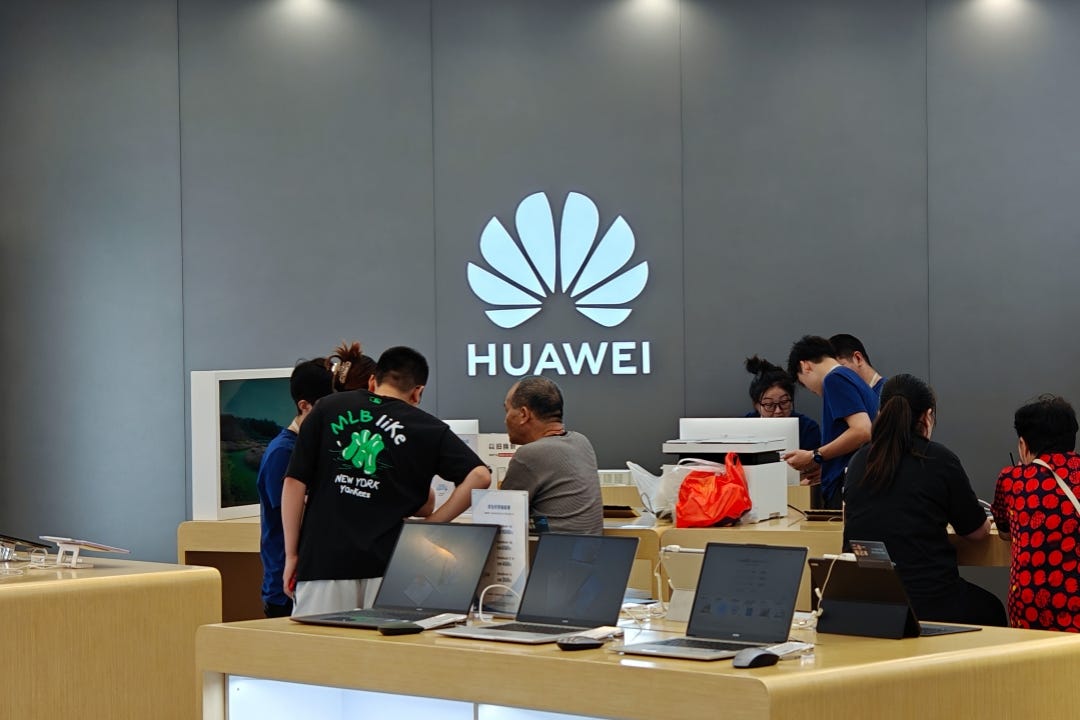Tech Insider: IQiyi VR Unit Not Paying Staff, Huawei’s Sanction-Defying Sales
Tesla’s China price cut leads to slump in auto stocks, Chinese carmakers drive into Indonesia
Consumers try out devices at a Huawei store in Shanghai’s Jing’an district on Aug. 7. Photo: VCG
IQiyi VR unit’s staff pays the price as metaverse hype fades
IQiyi Smart, the virtual reality (VR) equipment arm of streaming platform iQiyi Inc., has been delaying salary payments and laying off employees, sources told Caixin, as the startup struggles financially in a sector that has yet to see mainstream adoption.
Employees haven’t been receiving their full wages since March, several staff members told Caixin. The company has also undergone several rounds of downsizing in the past six months, with layoffs at some departments reaching up to 50%, the sources said.
iQiyi Smart didn’t comment.
The Beijing-based firm has launched several products including VR headsets since 2016 under the brand Qiyu. However, its struggles reflect challenges such as product pricing, limited content and performance in China’s VR hardware market.
Huawei’s sales keep growing as new businesses mitigate sanctions fallout
Huawei Technologies Co. Ltd.’s sales rose for a third straight quarter after new businesses like cloud services and a resurgent smartphone unit helped mitigate the fallout from U.S. sanctions.
Revenue rose 4.8% to 178.8 billion yuan ($24.7 billion) in the three months ended in June, according to calculations by Bloomberg based on the company’s first-half numbers. Net income almost tripled to 26.8 billion yuan after the company recorded gains from earlier business sales.
Huawei has been expanding its clientele to encompass China’s state-owned ports and coal mines, helping to digitize industries such as power generation. Its cloud infrastructure and services division has been gaining ground on Alibaba Group Holding Ltd. and Tencent Holdings Ltd., according to research firm Canalys.
Tesla’s China price cuts leads to slump in auto stocks
Tesla Inc. rolled out a new round of price cuts in China, sending auto stocks tumbling on concerns the move will respark a bruising price war that had showed signs of abating.
The automaker reduced the price of the top-end Long-Range and Performance versions of the Model Y SUV by 14,000 yuan ($1,900) to 299,900 yuan and 349,900 yuan respectively, according to a social media post Monday.
The cuts follow the likes of Geely Automobile Holdings Ltd.’s Zeekr brand and Zhejiang Leapmotor Technologies Ltd. earlier this month.
Tesla triggered the price war with an initial round of price reductions last year before further discounts in January that meant Tesla’s locally made cars were as much as 14% cheaper than last year.
Hunting for new growth, Chinese automakers drive into Indonesia
Chinese automakers are motoring into Indonesia, betting on the country’s fledgling green transition to compete with the dominant Japanese brands in Southeast Asia’s largest economy.
China’s largest SUV and pickup-truck maker Great Wall Motor Co. Ltd. and electric car startup Hozon Auto made their debuts last week at the ongoing Indonesia International Motor Show.
Hozon, which makes Neta-branded electric cars, said during the event it is poised to start sales in Indonesia in the fourth quarter. Last month, Hozon announced a partnership with PT Handal Indonesia Motor, aiming to start local production in the second quarter next year.
Great Wall and Hozon have been gearing up expansions in Southeast Asia, counting on the region’s fast-growing auto demand.
Southeast Asia is looking mighty fine to China’s data center firms
Chinese data center firms are ramping up their overseas expansion to ride the artificial intelligence (AI) wave, especially in Southeast Asia, said a senior executive at GDS Holdings Ltd., one of the country’s largest data center operators.
While traditional computing requires proximity to the end-use market, AI computing power is more oriented towards natural resources, and Southeast Asia has both resources and cost advantages, Jimmy Yu, senior vice president of international business at GDS, told Caixin on July 27.
Cloud vendors are GDS’ biggest customers, Yu said. The company has ramped up overseas expansion plans since 2020, including establishing an international headquarters in Singapore in 2021. It is also currently building a data center in Batam, Indonesia.
Evergrande’s EV unit soars on $500 million stake sale
The electric-vehicle (EV) unit of defaulted property developer China Evergrande Group agreed to sell a roughly 28% stake to Dubai-based startup NWTN Inc., sending the carmaker’s shares soaring Tuesday on expectations the deal could keep it in business.
NWTN will invest $500 million in China Evergrande New Energy Vehicle Group Ltd. in exchange for shares and a majority of the EV-maker’s board, the companies announced Monday. The transaction is subject to conditions including Evergrande Group’s debt restructuring, as well as regulatory and shareholder approvals.
Evergrande NEV jumped as much as 47% in Hong Kong trading Tuesday before paring gains.
The companies expect the deal to close in the fourth quarter.




